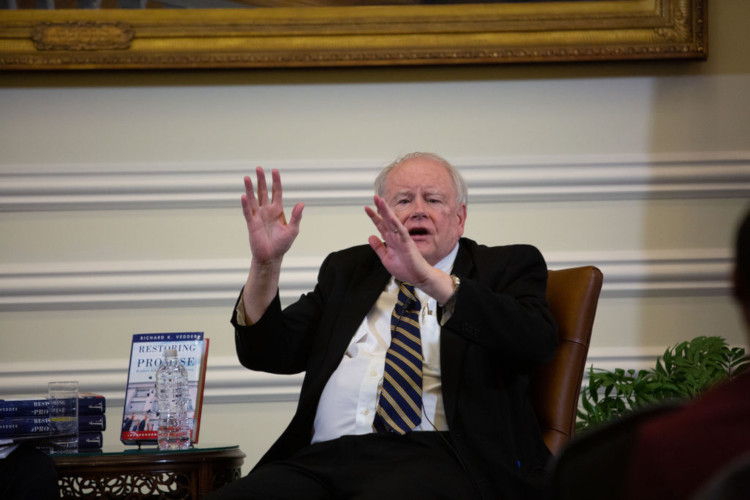
By Krystina Skurk
Dr. Richard Vedder, a professor Emeritus of economics at Ohio University was recently interviewed at Hillsdale in D.C. on his book, Restoring the Promise: Higher Education in America. Professor Vedder has been teaching more than fifty years in higher education and is a Senior Fellow at the Independence Institute.
Dr. Vedder’s latest book is a diagnosis of the biggest problems within higher education, from the rising tuition costs to the falling standards. The book argues that teaching within the university should be prioritized over research, athletics, and other extraneous programs.
Dr. Vedder also analyzes the broken financial aid system that undergirds higher education and makes several suggestions for fixing it.
Dr. Matthew Mehan, Director of Academic Programs and Worsham Teaching Fellow at Hillsdale in D.C. asked Dr. Vedder where he places the blame for these rising costs. Vedder explained that 50 years ago, with good intentions to make higher education more accessible, the federal government began offering student loans to low income students. This incentivized colleges to aggressively raise their fees. He said, “Tuition fees have tripled, adjusting for inflation, since the late '70s. A large part of that is due to the government involvement.”
Dr. Vedder argued that “the single most important thing that we could do would be to work to downsize and change the student loan program.” He admitted that getting the government out of the student loan business altogether is not likely. It is not in any elected official’s self-interest to do away with such popular programs.
However, Vedder does point out that there should be limits. Perhaps students in their eighth year of graduate school should not be relying on the federal government for loans. He also believes the private sector should take on a larger role.
Dr. Vedder explained that bloated bureaucracies within universities are also increasing expenses. Today, universities employ more administrators than faculty members.
“[W]hat's worse is it's crowding out the academic function of a university. The academic function is getting downgraded by people who are functionaries… people who are doing things that have nothing to do with learning.”
Another problem in higher education, according to Dr. Vedder, is that students are no longer learning as much as they used to and they certainly aren’t learning the “right” things. He points out that those in higher education like to measure everything, but the one thing that goes unmeasured is how much a student has learned in their four years of college.
During the question and answer portion of the evening a Hillsdale student said,
“[A]t Hillsdale, we really enjoy John Henry Newman and his work, The Idea of a University and in that, Newman talks about how the biggest contribution a university makes to the student is teaching him or her how to look at the world as an integrated whole, but also the mark that the university leaves on each student.”
In response Dr. Vedder stated, “[O]ur nation has lost sight of a lot of the things that used to be the glue that brought us together as a nation.” He said that many students are not even required to take history classes or learn about the Founding Fathers, and without this shared knowledge Americans have nothing to hold in common. “We need to move back to a core curriculum, like Hillsdale has done,” he said.